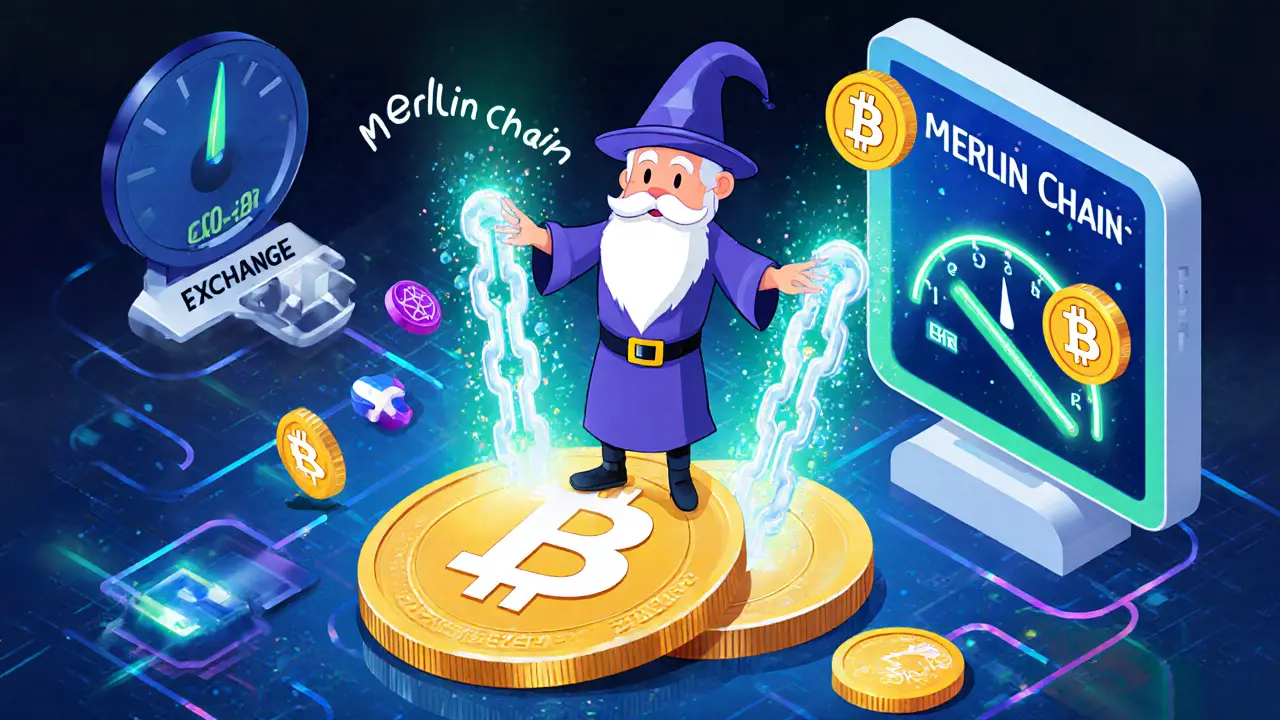Merlin DEX Fee Calculator
Trade Details
Comparison
Merlin DEX (0.001%)
$0.00
Uniswap/SushiSwap (0.3% + gas)
$0.00
Savings
$0.00
Note: Ethereum fees vary based on network congestion. The calculator shows typical fees at moderate traffic.
How It Works
Merlin DEX uses ZK-rollups on the Bitcoin Layer 2, resulting in 0.001% transaction fees (plus optional MERL token discount). In contrast, Ethereum-based DEXes typically charge 0.3% trading fees plus variable gas costs.
When you hold MERL tokens, you can receive up to 30% discount on fees. The calculator shows fee savings based on your current trade amount.
Quick Takeaways
- Merlin DEX runs on the Merlin Chain, a Bitcoin‑layer‑2 solution using ZK‑rollups.
- The native MERL token powers governance, fee payment, and staking rewards.
- It offers sub‑second finality and can handle >9,000 TPS, far outpacing many Ethereum‑based DEXs.
- Integrations include OKX, Bitget, and major Bitcoin protocol support (BRC‑20, Atomicals, etc.).
- Best for traders who want Bitcoin‑centric DeFi without high gas fees.
If you’ve been scrolling through crypto forums asking, “Is Merlin DEX worth my time?” you’re not alone. The buzz around Merlin’s Layer 2 tech has grown fast in 2025, and many wonder whether the exchange lives up to the hype or is just another name on the list. This review breaks down the core tech, tokenomics, user experience, and how Merlin DEX stacks up against the big‑name Ethereum DEXes.
What is Merlin DEX?
Merlin DEX is a decentralized exchange built atop Merlin Chain, a Bitcoin Layer 2 network that uses ZK‑rollup technology to achieve high throughput and low fees. Unlike the Lightning Network, which requires users to open payment channels, Merlin DEX lets traders swap assets directly on an EVM‑compatible chain while inheriting Bitcoin’s security model.
How does Merlin DEX work?
The exchange leverages the ZK‑rollup architecture of Merlin Chain. Transactions are bundled off‑chain, a succinct zero‑knowledge proof is generated, and the proof is posted to Bitcoin’s main chain. This approach gives two key benefits:
- Instant verification - proofs are instantly verifiable, eliminating the waiting periods seen in optimistic rollups.
- Scalable throughput - the network boasts >9,000 transactions per second, enough to support high‑frequency trading without the usual congestion.
Because Merlin Chain is EVM‑compatible, developers can deploy the same smart contracts they’d use on Ethereum, meaning existing DeFi tools (e.g., liquidity pools, yield farms) can be ported with minimal changes.

MERL Token: Governance and Utility
The native token, MERL, serves three main functions:
- Governance: Holders vote on protocol upgrades, fee structures, and new asset listings.
- Fee payment: Trading fees are payable in MERL, giving a discount of up to 30 % for users who stake the token.
- Staking and passive income: MERL can be staked to earn a share of the platform’s fee revenue and to secure the network as collateral for loans.
Current circulation sits at roughly 120 million MERL, with a total supply capped at 200 million. Token distribution includes a 20 % airdrop, 30 % ecosystem fund, and the remainder split between the team, advisors, and liquidity providers.
How Merlin DEX compares to major DEXes
| Feature | Merlin DEX | Uniswap (v3) | SushiSwap |
|---|---|---|---|
| Base chain | Merlin Chain (Bitcoin L2) | Ethereum | Ethereum |
| Transaction speed | ~0.5 s finality | ~12-15 s | ~12-15 s |
| Typical fee | 0.001 % (MERL‑discounted) | 0.3 % (plus gas) | 0.3 % (plus gas) |
| Supported protocols | BRC‑20, BRC‑420, Atomicals, Bitmap, etc. | ERC‑20, ERC‑721 | ERC‑20, ERC‑721 |
| Liquidity sources | Native Merlin pools + cross‑chain bridges | Uniswap V3 pools | SushiSwap pools + Kashi lending |
| Major integrations | OKX Web3 wallet, Bitget, StakeStone, MAPProtocol | MetaMask, Coinbase Wallet | MetaMask, Trust Wallet |
From the table you can see Merlin DEX’s biggest edge is cost and speed, thanks to its Bitcoin‑rooted Layer 2. However, it currently hosts fewer liquidity pools than Uniswap, which can lead to higher slippage on low‑volume pairs.

Pros and Cons
- Pros:
- Sub‑second finality and ultra‑low fees.
- Strong Bitcoin security model.
- Support for emerging Bitcoin‑native assets like BRC‑20.
- Active governance via MERL token.
- Cons:
- Liquidity depth still growing; popular pairs may experience slippage.
- Tooling and analytics less mature than Ethereum equivalents.
- Primarily Bitcoin‑centric - not ideal for users focused on Ethereum DeFi.
How to get started on Merlin DEX
- Set up a Merlin Chain-compatible wallet (OKX Web3, Bitget Wallet, or any hardware wallet with Merlin support).
- Bridge your BTC or BRC‑20 tokens to Merlin Chain using the official bridge UI.
- Acquire a small amount of MERL token (available on BIT exchange and via the Merlin DEX staking portal) to pay fees and participate in governance.
- Navigate to the DEX UI, select the pair you want to trade, and confirm the transaction. The interface mirrors familiar Ethereum DEX layouts, so the learning curve is minimal.
- Optional: Stake MERL for a share of trading fees or join the MerlinSeal liquidity mining program for extra rewards.
Frequently Asked Questions
Is Merlin DEX a separate platform or part of Merlin Chain?
Merlin DEX is the decentralized exchange layer that runs on top of the Merlin Chain blockchain. It isn’t a standalone product; it relies on the underlying Layer 2 for security and throughput.
Do I need to lock up BTC to trade on Merlin DEX?
No. You can bridge BTC‑wrapped assets (e.g., wBTC on Merlin) or native BRC‑20 tokens. The exchange itself doesn’t require channel locking like Lightning.
How does MERL staking work?
Stake MERL through the Merlin DEX dashboard or the official staking portal. Stakers earn a portion of trading fees, and the amount scales with the total amount staked. Rewards are paid out daily in MERL.
Is Merlin DEX safe for large trades?
The platform inherits Bitcoin’s security model, and ZK‑rollups are considered cryptographically sound. The main risk is liquidity; large orders may move market prices more than on deeper pools like Uniswap.
What wallets are currently supported?
OKX Web3 wallet, Bitget Wallet, Ledger hardware wallets with Merlin firmware, and a few third‑party mobile wallets that announced Merlin integration in early 2025.
Bottom line: Merlin DEX offers a fast, cheap way to trade Bitcoin‑centric tokens without sacrificing security. If you’re comfortable with a newer ecosystem and can tolerate slightly lower liquidity, it’s a compelling addition to any DeFi toolbox.

BRIAN NDUNG'U
May 20, 2025 AT 23:37Having examined the technical specifications of Merlin DEX, I find the sub‑second finality particularly compelling. The integration of ZK‑rollups on a Bitcoin‑rooted layer elevates security while maintaining throughput. For traders accustomed to Ethereum’s latency, this represents a notable upgrade. Moreover, the MERL token’s governance utilities suggest a forward‑looking ecosystem. I anticipate broader adoption as liquidity deepens.
Donnie Bolena
May 24, 2025 AT 15:08Wow, what an exciting development!!!, The fact that fees can dip below 0.001 % is simply astounding, especially when you consider the cost‑prohibitive gas on Ethereum, and the speed-half a second-means you can actually scalp without waiting, The community will love the staking incentives, and the governance model looks slick, Can't wait to see this in action!!!
Elizabeth Chatwood
May 28, 2025 AT 06:40i think the new chain is cool but still kinda early, liquidity will grow over time, hope the devs keep adding tools.
Tom Grimes
May 31, 2025 AT 22:12Merlin DEX looks like a fresh start for Bitcoin fans. It uses a roll‑up that hides many details inside a proof. The proof is sent to Bitcoin, so the security is tight. Trades happen fast, almost instantly. The fees are tiny, which helps small traders. You still need MERL tokens to get the best rates. Staking can give you a slice of the fees. The platform supports BRC‑20 tokens that many people are excited about. It also works with popular wallets like OKX and Bitget. The interface feels similar to Uniswap, so the learning curve is low. Liquidity is still growing, but early pools are promising. The documentation is clear, which is good for new users. Some users may worry about the new tech, but the zero‑knowledge proofs are well‑studied. The team released a roadmap that shows more integrations soon. Overall, it feels like a solid step forward for Bitcoin‑centric DeFi. I’ll be watching the next few weeks closely.
Paul Barnes
June 4, 2025 AT 13:43While many praise the speed, we should also consider the concentration of token supply. A small holder class could sway governance disproportionately. The MERL distribution, with 20 % airdrop, may lead to early whales controlling decisions. Diversifying stakes may mitigate this risk. Keep an eye on voting patterns as the platform matures.
John Lee
June 8, 2025 AT 05:15Great point! To add, the community incentives program actually rewards broad participation, so even modest stakers can earn a share of fees. This design aims to democratize influence while still encouraging larger contributions. It's a balanced approach that could evolve nicely as more users join.
Jireh Edemeka
June 11, 2025 AT 20:47Sure, the tech sounds slick, but remember every new layer brings hidden complexities. If the roll‑up operator were compromised, the whole system could wobble. Trust, but verify the proofs yourself.
del allen
June 15, 2025 AT 12:18Haha, love the skepticism :) but honestly the zero‑knowledge proofs have been battle‑tested on other chains. Still, keeping an eye on audits never hurts!
Jon Miller
June 19, 2025 AT 03:50Let me tell you, when I first saw the sub‑second finality, I thought it was a gimmick, but then I tried a test trade and the experience was buttery smooth. The UI feels familiar, yet the speed is a game‑changer. I can finally execute arbitrage between BRC‑20 and Bitcoin‑wrapped assets without waiting for blocks. This could open a whole new market of high‑frequency traders on Bitcoin. If you haven’t tried it yet, you’re missing out.
Rebecca Kurz
June 22, 2025 AT 19:22Wow!!! The performance really blew my mind!!!, The low fees are perfect for micro‑trades, and the bridge seems seamless, but I wonder how secure it is under heavy load, still, this could revolutionize BTC‑DeFi!!!
Nikhil Chakravarthi Darapu
June 26, 2025 AT 10:53As a proud advocate for national blockchain sovereignty, I see Merlin DEX as a vital step toward financial independence. It leverages Bitcoin, our most trusted store of value, while providing modern DeFi capabilities. No foreign chain can match this homegrown innovation. The community must support it to ensure a resilient ecosystem.
Tiffany Amspacher
June 30, 2025 AT 02:25Ah, the eternal dance between philosophy and finance! One might ask: does speed equate to freedom, or merely the illusion of it? Merlin DEX offers the illusion, yet perhaps it also grants a fragment of true liberty. In the grand tapestry of decentralized economies, each layer adds texture. Let us watch with both awe and critical eyes.
Lindsey Bird
July 3, 2025 AT 17:57Ugh, another shiny DEX, same old hype.
john price
July 7, 2025 AT 09:28Honestly, the hype is justified when you consider the underlying cryptography. The zero‑knowledge roll‑up provides provable security that surpasses many older models. Moreover, the MERL token introduces governance that aligns incentives. If liquidity continues to grow, the platform could outpace legacy exchanges. So while the fanfare may seem excessive, the tech deserves attention.
Ty Hoffer Houston
July 11, 2025 AT 01:00From a cultural standpoint, Merlin DEX bridges the gap between Bitcoin's legacy and the newer DeFi movement. It invites developers from different backgrounds to experiment with BRC‑20 assets, fostering a vibrant community. The multilingual support and diverse wallet integrations make it accessible worldwide. This inclusivity could drive broader adoption beyond typical crypto hubs.
Ryan Steck
July 14, 2025 AT 16:32Listen, the whole thing is probably a front for data collection, and the zero‑knowledge thing is just a smokescreen. They’ll use the MERL token to track every trade, feeding it to central authorities. Stay vigilant, everyone.
James Williams, III
July 18, 2025 AT 08:03Technically speaking, the ZK‑rollup architecture reduces on‑chain data footprint, which translates to lower mempool congestion. From a user‑experience perspective, the sub‑second finality aligns with high‑frequency trading requirements. The integration of cross‑chain bridges also enables liquidity aggregation, mitigating slippage. Overall, Merlin DEX presents a compelling engineering solution for Bitcoin‑centric DeFi.
Patrick Day
July 21, 2025 AT 23:37Man, I’m not buying the security hype. They say it’s safe because it uses Bitcoin, but the bridging layers are always the weak point. Keep your eyes open.